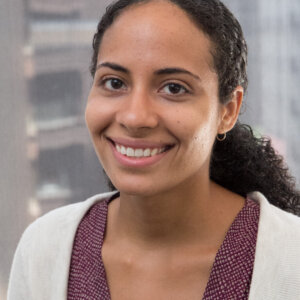Stories of Community Riverfront Transformations
Nearly 100 attendees joined the Metropolitan Planning Council (MPC) at a May 28th virtual even to hear about three organizations that are transforming their community riverfronts. These projects activate and enliven through the incorporation of art and placemaking, with these tactics adding up to big changes as they create places for people to go and become well-loved corners of their neighborhoods. Thanks to these projects, aligned with Our Great Rivers, waterways across Chicago are reinvigorated.
Learning about Our Great Rivers
First up was MPC’s Chloe Gurin-Sands providing background on Our Great Rivers, a community vision to make the Des Plaines, Calumet and Chicago Rivers more inviting, living and productive, released in 2016 by the City of Chicago, Metropolitan Planning Council, Chicago Metropolitan Agency for Planning, and
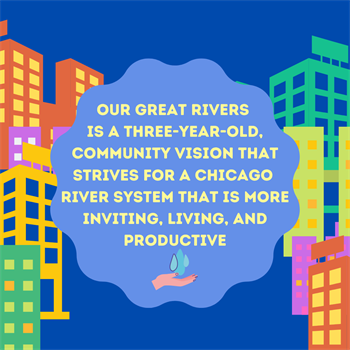
Friends of the Chicago River. Chloe provided a brief overview of the vision’s main goals as well as the community outreach process that led to their creation. This engagement process included input and feedback from more than 6,000 residents.
Chloe’s remarks were capped off by the Chicago Community Trust’s Cora Marquez, who provided additional context on the role of the Trust as a funder and partner to each of the community groups, providing the support needed for project implementation. She also highlighted some inspiring stats. Since 2017, 19 community-led initiatives have formed across the river system, with more than 130 organizational and institutional partners, together making progress on 18 of the 26 goals outlined in Our Great Rivers.
Sharing community stories and achievements
Northwest Portage Walking Museum
And then it was on to the main event. Working from north to south down the river system, Maryrose Pavkovic, managing director of the Chicago Public Art Group, kicked-off the presentation by discussing the Northwest Portage Walking Museum’s work along the Des Plaines River.
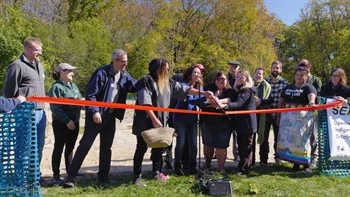
October ribbon cutting celebrating Serpent Mound
The Northwest Portage Walking Museum is a nine-mile outdoor multi-faceted learning experience that is deeply rooted in the natural environment and Native American cultural history of Chicago. The Chicago Public Art Group, working closely with the American Indian Center and the Portage Park Neighborhood Association, has leveraged the Northwest Portage Walking Museum as a collaborative place-keeping process to strengthen community bonds. One of their major successes in the last year includes the installation of new effigy mounds at the Forest Preserve’s Schiller Woods.
These Schiller Park “Serpent Mounds” were celebrated on Indigenous Peoples Day in October 2019 and their development process included ground stomping ceremonies in fall 2918 to prepare for mound building. One additional highlight was the collaboration of artists Laura Miracle and Jamie Topper with American Indian Center youth on the design and installation of the “Nesewin” sculpture at the Dunning Reed Conservation Area.
This year, the team plans to build upon their achievements from the last two years by upping their online presence through launching at Northwest Portage Walking Museum website as well as finalizing their strategic goal around wayfinding and signage, business partnerships and fundraising for the effigy mounds in the Park District’s Horner Park.
Our Great Rivers Chinatown
Next up was Grace Chan, executive director of Coalition for a Better Chinese American Community to talk about their work in Chinatown’s Ping Tom Park along the Chicago River’s South Branch. Over the past two years, they have created two large scale public art interventions under the Chinatown viaduct that cuts through the park. These murals, “All As One” and “Between the Mountains and the Water” were completed in collaboration with artists and community members, making the park, and the river, more inviting. The park has also hosted dragon boat classes on the river in partnership with Greater Chicago Dragon Boat Club and has worked on a signage and wayfinding plan to help visitors and residents move around and find the river and Ping Tom Park more easily.
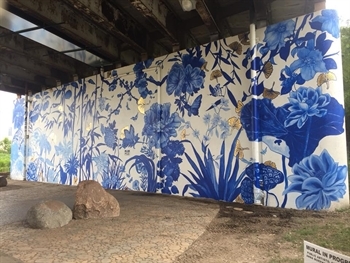
First mural “All as One”
In 2020, the team plans to build upon all the planning, community engagement and fundraising it has already completed, including: the Chinatown Community Vision Plan, Chinatown Walkability Project, Chinatown Parking Management Study, and the Chinatown Wayfinding Plan. This year, a baseline study of the business landscape as well as a survey of event attendees from the Chicago Water Taxi will collect data on visitor demographics, spending habits, and activities conducted while in Chinatown. The team includes Coalition for a Better Chinese American Community, Ping Tom Park Advisory Council, Chinatown Chamber of Commerce, Chinatown #73 SSA, Wendella Tours, and Northern Illinois University.
Major Taylor Trail Riverfront Improvement Project
Brenda Dixon, founder and president of the Major Taylor Trail Keepers closed out the program with her story of riverfront change along the Major Taylor Trail near the Little Calumet River. The Major Taylor Trail is a rail to trail connection on the city’s south side that runs through five wards, crosses three Metra lines, borders communities home to more than 200,000 residents, and is governed by three separate jurisdictions.
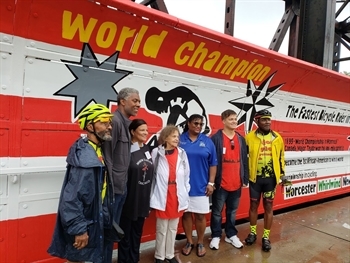
Partners in activating the Major Taylor Trail
Named for the first African-American world champion cyclist, there was a desire to embed some of the history and greatness of this accomplishment into the Major Taylor Trail. A mural, unveiled in June 2018, now stands at the site where the trail crosses the Little Calumet River, showcasing the achievements of Marshall Walter ‘Major’ Taylor through a history making timeline. This mural and project has received widespread recognition. Brenda Dixon, and all her partners, continue to make progress on enlivening the entire trail by completing a signage and wayfinding plan in late 2019, to improve the trail experience while simultaneously raising awareness of the trail and Major Taylor’s legacy.
Upcoming goals include implementation of signage and wayfinding plan with branded signs to guide trail users and visitor and the annual hosting of the community bike festival to raise awareness and additional funds for work in 2020 and beyond.
What’s next for Our Great Rivers projects?
None of these accomplishments would have been possible without the hard work and dedication of community members and partners in spearheading these thoughtful, vibrant projects. They represent a larger network (19 and counting) of projects that have been funded by the Chicago Community Trust, since 2017, to center community visions for Chicago’s rivers. MPC is excited about all the work that has occurred to date and is looking forward to digging in to this new year of funded projects to continue this momentum and provide resources and support to projects that help grow community wealth, activate their neighborhoods, and support the restoration of local ecologies and natural environments.
Stay tuned to MPC’s website and Great Rivers Chicago to listen to this recorded webinar and learn more about these projects as well as track progress on all the 2020 work.
